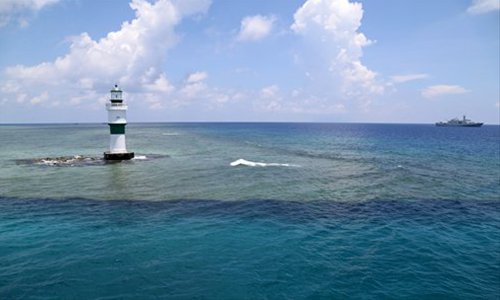Restraint in South China Sea needed against US inflammatory opinions
By Ge Hongliang Source:Global Times Published: 2020/6/9 21:43:40

A photo shows the lighthouse on the Nansha Islands' Zhubi Reef in the South China Sea. Photo: Xinhua
Some Western media outlets have launched a new wave of public opinion offensive against China.A CNN report on Monday hyped up a standoff between China and Malaysia in the South China Sea that has lasted more than a month. Even though this was old news that took place earlier this year, CNN criticized China for its "growing aggression" and "forcefulness," which are "partly driven by the global coronavirus pandemic."
Malaysia is one of the South China Sea claimants. Compared with countries such as Vietnam and the Philippines, Malaysia has been regarded as a low-profile pragmatist when it comes to the South China Sea issue. The country has played it safe.
Policies pursued by Malaysia include: First, the South China Sea dispute is not at the top agenda of dialogues between Beijing and Kuala Lumpur. Malaysia is more willing to take chances of political dialogues to promote pragmatic cooperation with China. Second, oil and gas exploration is a priority for Malaysia's South China Sea policies. Third, the country is not keen on sensationalizing the South China Sea disputes. Large protests triggerd by the South China Sea differences are rarely seen in Malaysia. Fourth, Malaysia has taken a positive attitude toward promoting consultations and preventative diplomacy among South China Sea claimants. It has played a relatively proactive role in negotiations regarding the Declaration on the Conduct of Parties in the South China Sea, and on the Code of Conduct in the South China Sea.
Thanks to such policies, Malaysia and China have a lot in common to promote pragmatic cooperation and to maintain regional stability.
Yet it's noticeable that subtle changes are taking place in Malaysia's South China Sea policies. In December 2019, the country submitted an extended shelf claim in the South China Sea to the UN's Commission on the Limits of the Continental Shelf, seeking to establish the outer limits of its legal continental margin beyond the 200 nautical mile limit.
Breaking with past postures, Malaysia has now begun exploration and development of oil and gas in waters near the Wan'an Tan in the Nansha Islands, an area disputed by China, Malaysia and Vietnam. Moreover, Malaysia has become increasingly vigilant toward China for the latter's measures to safeguard its legitimate rights in the South China Sea.
However, the changes in Malaysia's South China Sea policies don't mean the country lacks understanding of the complexities and sensitivities of the South China Sea issue. In fact, Malaysian Foreign Minister Hishammuddin Hussein in April called for peaceful means amid the China-Malaysia standoff, and reaffirmed Malaysia's commitment to peace in the disputed waters.
Moreover, China-Malaysia disputes in the South China Sea have attracted public attention. This is directly related to the US and Australian navies' interference in the region, and the influence of US officials, think tanks, and mainstream media.
In April, the amphibious assault ships USS America, USS Bunker Hill, and USS Barry sailed with Royal Australian Navy frigate HMAS Parramatta to conduct combined exercises in the South China Sea.
The US and Australian warships intentionally sailed near where the China-Malaysia standoff took place. Meanwhile, US Indo-Pacific Command spokesperson Nicole Schwegman said that their "continued operational presence in the South China Sea" is "to promote freedom of navigation and overflight," and the US "supports the efforts of our allies and partners to determine their own economic interests."
In April, US Secretary of State Mike Pompeo told his Southeast Asian counterparts that China is taking advantage of the COVID-19 pandemic to push its so-called territorial ambitions in the South China Sea. He also regarded China's maintaining of stability there as "bullying." Then, US media, such as CNN, reported on the recent China-Malaysia interactions in the South China Sea in an attempt to echo Pompeo's vindictive views.
From this perspective, the China-Malaysia dispute has become a heated topic for the US to further attack China. The increasingly intense China-US disputes and major power competition in the South China Sea serve as sober and stern warnings that China, Malaysia and other disputing parties need to remain restrained and be vigilant against inflamed US-led public opinion about the South China Sea.
The author is deputy director with the College of ASEAN Studies at Guangxi University for Nationalities and a senior research fellow at the Charhar Institute. opinion@globaltimes.com.cn
Posted in: VIEWPOINT,OTHER REGIONS